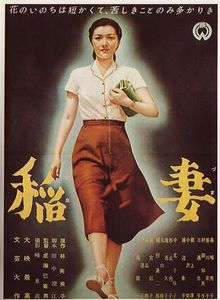fiction.wikisort.org - Movie
Lightning (稲妻, Inazuma) is a 1952 Japanese drama film directed by Mikio Naruse. It is based on the 1936 novel by Fumiko Hayashi and was the second in a series of adaptations of Hayashi's work by Naruse after the 1951 Repast.
| Lightning 稲妻 Inazuma | |
|---|---|
 Japanese movie poster | |
| Directed by | Mikio Naruse |
| Written by |
|
| Starring |
|
| Cinematography | Shigeyoshi Mine |
| Edited by | Toyo Suzuki |
| Music by | Ichirō Saitō |
Production company | Daiei Film |
| Distributed by | Daiei Film |
Release date |
|
Running time | 87 |
| Country | Japan |
| Language | Japanese |
Plot
23-year-old Kiyoko works as a tour guide in Tokyo. Like her single mother and her three older siblings, all from different fathers, she lives in the city's Shitamachi area. From her siblings, Kiyoko is closest to her sister Mitsuko, who runs a clothing store with her husband Rohei. Her brother Kasuke is an unemployed war veteran, who wastes his time in pachinko arcades. Her oldest sister Nuiko has her husband Ryuzo invest in a hotel enterprise by baker Tsunakichi, who secretly is Nuiko's lover. Nuiko pushes Kiyoko to date Tsunakichi, and even slaps Kiyoko when she refuses to see him. When Rohei dies, his mistress Ritsu approaches Mitsuko and claims a share from Rohei's life insurance because he his the father of her new born child. Also Nuiko, Kasuke and the mother want to borrow money from Mitsuko for their own pursuits. Mitsuko eventually decides to use the money partly for Ritsu's demands and for opening up her own coffee shop.
Kiyoko becomes frustrated with the tensions in her family and moves out into a flat of her own. She becomes acquainted with Shuzo and Tsubomi, a brother and sister her age living next door, and Kiyoko and Shuzo slowly develop an interest in each other. During a visit to Mitsuko's new café, Kiyoko is repelled to see that Tsunakichi is now involved in her sister's business as well and possibly her lover, and has to fight off his obtrusive advances. When her mother comes to look for the missing Mitsuko at Kiyoko's place, they have an argument about the many fathers Kiyoko grew up with and start crying, while a thunderstorm passes by. Afterwards, Kiyoko offers to buy her mother new summer clothes and walks her home.
Cast
- Hideko Takamine as Kiyoko
- Mitsuko Miura as Mitsuko
- Chieko Murata as Nuiko
- Chieko Nakakita as Ritsu
- Kenzaburo Uemura as Ryuzo
- Kyōko Kagawa as Tsubomi
- Jun Negami as Shuzo
- Sakae Ozawa as Tsunakichi
- Maruyama Osa as Kasuke
- Kumeko Urabe as mother
Awards and legacy
Lightning won the 1952 Blue Ribbon Award for Best Film, Best Director (Mikio Naruse) and Best Supporting Actress (Chieko Nakakita).[2] It was also awarded the 1952 Mainichi Film Concours for the best film score by Ichirō Saitō and again for Best Supporting Actress (Chieko Nakakita).[3]
Film historian Donald Richie called Lightning an "almost perfect realization of Fumiko Hayashi's novel" and "a balanced union of literature and cinema".[4]
References
- (in Japanese) http://www.jmdb.ne.jp/1952/cb002190.htm accessed 13 June 2009
- "Blue Ribbon Awards 1952 (official site)" (in Japanese). Archived from the original on 30 November 2012. Retrieved 20 January 2021.
- "Mainichi Awards 1952 (official site)" (in Japanese). Retrieved 20 January 2021.
- Anderson, Joseph L.; Richie, Donald (1959). The Japanese Film – Art & Industry. Rutland, Vermont and Tokyo: Charles E. Tuttle Company.
External links
На других языках
- [en] Lightning (1952 film)
[ru] Молния (фильм, 1952)
«Молния» (яп. 稲妻: инадзума) — японский чёрно-белый фильм-драма режиссёра Микио Нарусэ, вышедший на экран в 1952 году. Фильм снят по роману писательницы Фумико Хаяси. Кинолента показывает взгляд Нарусэ на жизнь через множество женских переживаний. Портрет девушки, которая преодолевает неопределенность своих идей, чтобы найти свой собственный образ жизни на фоне послевоенной Японии.Другой контент может иметь иную лицензию. Перед использованием материалов сайта WikiSort.org внимательно изучите правила лицензирования конкретных элементов наполнения сайта.
WikiSort.org - проект по пересортировке и дополнению контента Википедии